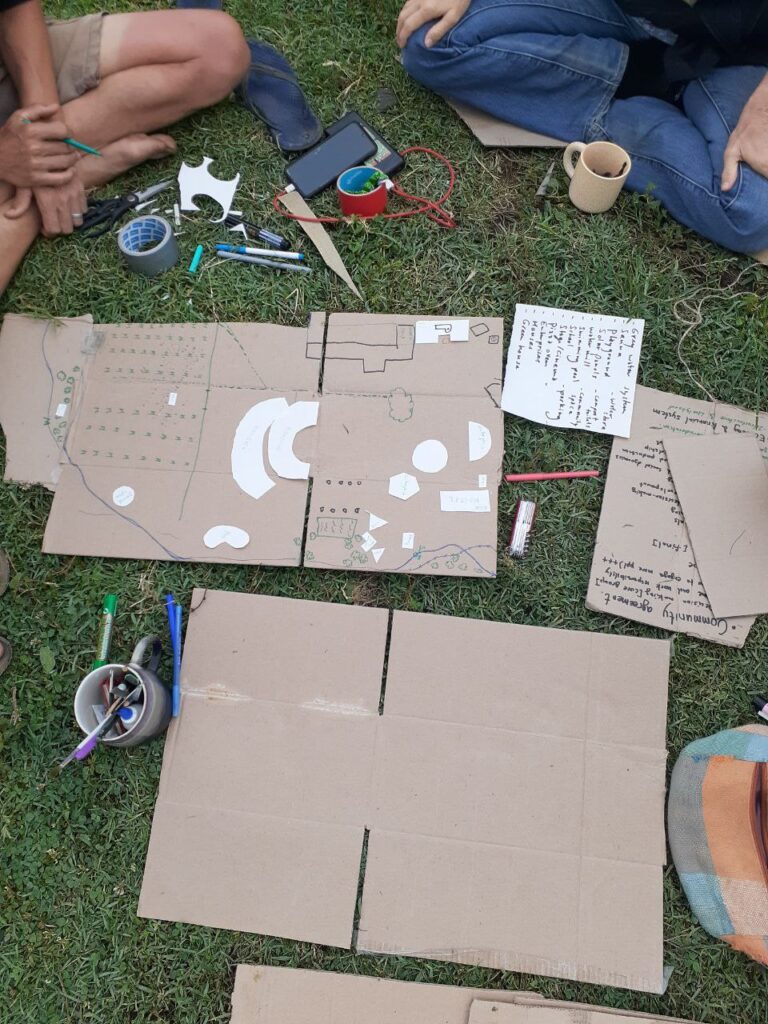What? How?
What is an ecovillage?
The Global Ecovillage Network defines an ecovillage as an intentional or traditional community using local participatory processes to holistically integrate ecological, economic, social, and cultural dimensions of sustainability in order to regenerate social and natural environments
In Georgia, intentional ecovillages have yet to be established, but there are community-based business projects. However, numerous successful examples of ecovillages can be found in Europe, the Americas, and Asia.

WHAT IS THE PLAN?
We envision to create a innovative living and working space for 10 – 30 households.
The village will feature:
- Residential plots where inhabitants can create their own environmental friendly living spaces;
- Co-housing spaces for volunteers, travelers and prospect members;
- Community Center to connect, learn, organize events, trainings, retreats and host visitors;
- Communal gardens and food forest that will provide a large share of the food for inhabitants and visitors;
- Artisanal workshops, crafting and tool sharing;
- Social and private businesses by (groups of) residents, adhering to the community eco & social guidelines, including regenerative farms, handmade products, guesthouse, café, etc.
- Informal and non-formal learning space for children and adults (Free, democratic school orientated)
Vision
We are a voluntarily, self-organized, non-hierarchical, inclusive community thriving in mutual respect and support. We are co-learning and implementing approaches to regenerative ecology and culture. Being interconnected with the wider community, we desire to create a sustainable society.
Mission
To practice sustainable community living as a means of reviving rural Georgia. Inhabitants pursue sustainable, healthy, happy and balanced lifestyles in harmony with nature and with each other, supporting cultural- and biodiversity, protecting natural resources and the climate.
Core Values
What is an ecovillage?
The Global Ecovillage Network defines an ecovillage as an intentional or traditional community using local participatory processes to holistically integrate ecological, economic, social, and cultural dimensions of sustainability in order to regenerate social and natural environments
In Georgia, intentional ecovillages have yet to be established, but there are community-based business projects. However, numerous successful examples of ecovillages can be found in Europe, the Americas, and Asia.

WHAT IS THE PLAN?
We envision to create a innovative living and working space for 10 – 30 households.
The village will feature:
- Residential plots where inhabitants can create their own environmental friendly living spaces;
- Co-housing spaces for volunteers, travelers and prospect members;
- Community Center to connect, learn, organize events, trainings, retreats and host visitors;
- Communal gardens and food forest that will provide a large share of the food for inhabitants and visitors;
- Artisanal workshops, crafting and tool sharing;
- Social and private businesses by (groups of) residents, adhering to the community eco & social guidelines, including regenerative farms, handmade products, guesthouse, café, etc.
- Informal and non-formal learning space for children and adults (Free, democratic school orientated)
Vision
We are a voluntarily, self-organized, non-hierarchical, inclusive community thriving in mutual respect and support. We are co-learning and implementing approaches to regenerative ecology and culture. Being interconnected with the wider community, we desire to create a sustainable society.
Mission
To practice sustainable community living as a means of reviving rural Georgia. Inhabitants pursue sustainable, healthy, happy and balanced lifestyles in harmony with nature and with each other, supporting cultural- and biodiversity, protecting natural resources and the climate.
Core Values
What is an ecovillage?
The Global Ecovillage Network defines an ecovillage as an intentional or traditional community using local participatory processes to holistically integrate ecological, economic, social, and cultural dimensions of sustainability in order to regenerate social and natural environments
In Georgia, intentional ecovillages have yet to be established, but there are community-based business projects. However, numerous successful examples of ecovillages can be found in Europe, the Americas, and Asia.

WHAT IS THE PLAN?
We envision to create a innovative living and working space for 10 – 30 households.
The village will feature:
- Residential plots where inhabitants can create their own environmental friendly living spaces;
- Co-housing spaces for volunteers, travelers and prospect members;
- Community Center to connect, learn, organize events, trainings, retreats and host visitors;
- Communal gardens and food forest that will provide a large share of the food for inhabitants and visitors;
- Artisanal workshops, crafting and tool sharing;
- Social and private businesses by (groups of) residents, adhering to the community eco & social guidelines, including regenerative farms, handmade products, guesthouse, café, etc.
- Informal and non-formal learning space for children and adults (Free, democratic school orientated)
Vision
We are a voluntarily, self-organized, non-hierarchical, inclusive community thriving in mutual respect and support. We are co-learning and implementing approaches to regenerative ecology and culture. Being interconnected with the wider community, we desire to create a sustainable society.
Mission
To practice sustainable community living as a means of reviving rural Georgia. Inhabitants pursue sustainable, healthy, happy and balanced lifestyles in harmony with nature and with each other, supporting cultural- and biodiversity, protecting natural resources and the climate.
Core Values
Important aspects
We believe that the right people with the right concepts are as important as the right place. We spent the last years conceptualizing our vision and to elaborate our values. We also figured out practical, financial and legal issues with the help of our network. Through numerous land visits, joint trips and meetings we learned about our needs and existing possibilities.
Environmental responsibility: We pursue lifestyles that minimize the impact on the environment around us and globally. Building materials we use are mostly recycled and / or compostable. Examples are clay, straw, wood, earth, etc.
We will use modern technologies where appropriate to ensure (energy) efficiency and self sufficiency. Examples are solar panels for heat and electricity, waste water source separation and treatment, rainwater harvesting, etc.
Permaculture: We strive to produce most of our own food using Permaculture principles. That means we regenerate the earth, increasing biodiversity, while covering most of our nutrition and some material needs. Only natural pest control and fertilization will be used with a focus on increasing soil health and ecological balance.
Education: A democratic school and free learning spaces for people of all ages are being planned and envisioned.
Our objective is to make learning an engaging experience. In our vision, both children and adults learn together, from one another, through self-discovery, and by sharing experiences. We continuously draw inspiration from alternative educational approaches and ideas from around the world.
Economy: we explore alternative economic models that maximize human and ecological well being, For example:
- Social enterprises;
- Sharing of time and goods;
- Awareness on distribution of power, class differences.
Ownership: The land of the Ecovillage is owned by a non-profit legal entity.
Each inhabitant is entitled to a plot of land to build their house and sustain themselves. The house and possible enterprise will be in private ownership. The legal entity will finance infrastructure and maintenance through new members/inhabitants loans and communal businesses. The loans are refundable upon leaving. For communal expenditures such as the community center and social enterprises, grants and crowdfunding will be sought.
You can get involved in various ways:
- As a Resident
- As a Volunteer/Advisor
- As a Donor
- As a Loaner
Subscribe to our newsletter
Receive occasional updates on our latest advancements and the projects we’re bringing to life.
Interested in our project?
Whether you’re interested in becoming a resident in the village, volunteering, or if you have any questions, don’t hesitate to contact us. We’d love to hear from you.
